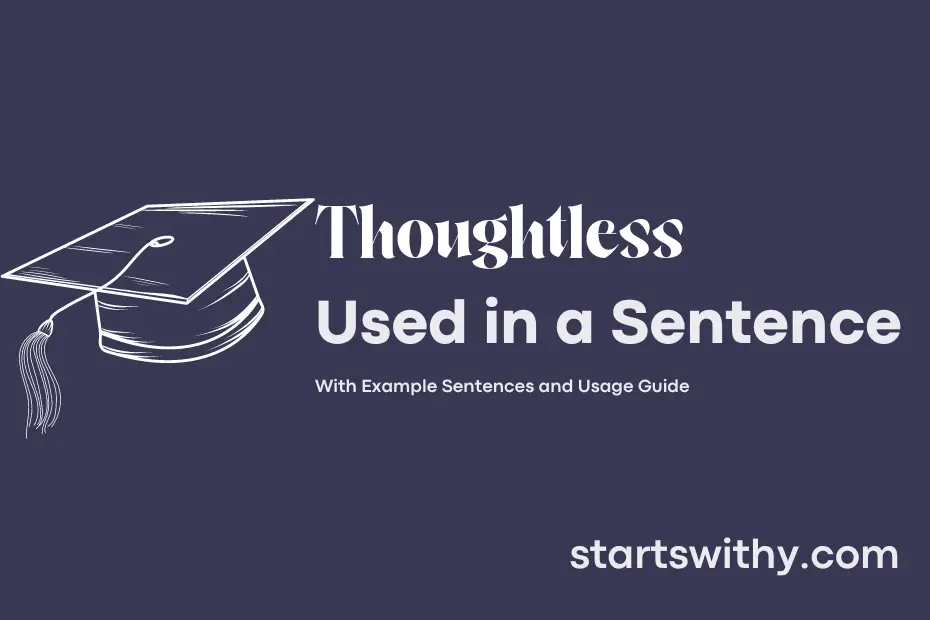Have you ever said or done something without really thinking about it? That’s the essence of being “thoughtless.” This mentality often leads to actions or words that are careless, impulsive, or insensitive.
In everyday interactions, a thoughtless remark or behavior can have unintended consequences, hurting feelings and damaging relationships. Being mindful of our thoughts and actions helps us avoid thoughtless mistakes and promotes more thoughtful and considerate communication.
7 Examples Of Thoughtless Used In a Sentence For Kids
- Thoughtless actions can hurt others.
- We should always think before doing something thoughtless.
- It’s important to be kind and not thoughtless with our words.
- Remember to consider others’ feelings and not be thoughtless.
- Being thoughtless can lead to accidents.
- Let’s always strive to be thoughtful, not thoughtless.
- Being thoughtless is not a good trait to have.
14 Sentences with Thoughtless Examples
- Thoughtless behavior, such as skipping classes, can negatively impact your academic performance.
- It’s important to avoid thoughtless spending habits and create a budget to manage your expenses effectively.
- Engaging in thoughtless copying from your peers can lead to serious consequences like plagiarism charges.
- Submitting an assignment without proofreading it can be a result of thoughtless oversight.
- Choosing a major without considering your interests and skills can be a thoughtless decision.
- Skipping meals due to a busy schedule is a thoughtless way to prioritize your health.
- Pulling an all-nighter before an exam due to thoughtless procrastination is not a sustainable study habit.
- Setting unrealistic goals without considering your capabilities is a thoughtless approach to academic success.
- Not participating in extracurricular activities can be considered a thoughtless missed opportunity to enhance your college experience.
- Ignoring mental health issues and not seeking help is a thoughtless neglect of your well-being.
- Picking electives without researching their relevance to your academic or career goals is a thoughtless decision.
- Walking alone on campus late at night without taking safety precautions is a thoughtless risk.
- Sending rude or thoughtless emails to professors can damage your professional reputation.
- Choosing to skip internships or industry exposure opportunities can be a thoughtless mistake that hinders your future career prospects.
How To Use Thoughtless in Sentences?
To use Thoughtless in a sentence, start by identifying a situation where someone is acting in a careless or inconsiderate manner. For example, “He made a thoughtless comment that hurt her feelings.” In this sentence, thoughtless is used to describe a remark that was made without careful consideration of its impact.
Another way to use thoughtless is to describe someone’s behavior that lacks mindfulness or thoughtfulness. For instance, “Her thoughtless actions led to a series of mistakes at work.” Here, thoughtless indicates that the person’s actions were impulsive or reckless.
You can also use thoughtless to describe a decision or choice that was made without proper consideration of its consequences. For example, “It was thoughtless of him to drive home after drinking.” In this sentence, thoughtless highlights the lack of careful thinking before making the decision to drive.
In summary, thoughtless is an adjective that describes actions, remarks, or decisions made without careful consideration. By incorporating this word into your sentences, you can effectively convey instances where someone is acting in a careless or inconsiderate manner.
Conclusion
In conclusion, thoughtless actions or statements can have harmful consequences both personally and towards others. From hurting someone’s feelings with thoughtless remarks to causing accidents due to reckless behavior, acting without consideration or mindfulness can lead to negative outcomes. It is important to pause and think before speaking or acting, as thoughtlessness can damage relationships, reputation, and even physical well-being.
Being intentional and mindful in our words and actions can foster healthier interactions and prevent unnecessary harm. By taking the time to consider the impact of our choices and engaging with thoughtfulness, we can promote understanding, empathy, and positive outcomes in our everyday lives.



